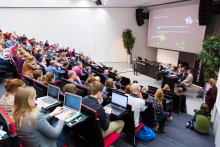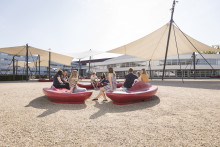The Education Day was kicked off by a debate that included members of academia, students and the business community and was moderated by Mirjam Bult from the UT’s Executive Board. The panelists, as well as the audience, discussed several statements related to the future of education.

Will universities be 100% digital?
‘Online university won’t attract the student of the future,’ Ronald Koorn, partner at KPMG Advisory, began the debate. ‘Education has three functions: providing a degree, individualization – developing personal skills – and finally socialization, teaching students how to become a good citizen. Not all of this can be achieved through online teaching. Digital learning has many benefits and it is great for developing your skills, but it won’t bring you much further in society.’
Some members of the audience disagreed with this statement, pointing out that the students of the future don’t include only young Bachelor’s students, but also people of all ages interested in widening their knowledge, for whom online university would be ideal. It was also mentioned that a fully digital university would allow students to better combine their studies with work, which is the best way to truly learn their trade. On top of that, virtual learning makes it easier for everyone around the world to have access to the best courses, not only to courses offered locally.

Skills more important than knowledge
On the other hand, many people in the lecture hall agreed with Ronald Koorn’s opinion, reminding that online learning doesn’t permit lab work, which is crucial for disciplines such as engineering. ‘I would personally not hire people who only learnt online, because they might lack many important skills,’ said Aldert Kamp, Director of Education Aerospace Engineering at TU Delft.
‘For the student of the future, skills matter more than content,’ Kamp continued the debate. ‘Graduates are smart and knowledgeable, but they often miss engineering skills needed in the real world, such as ability to cooperate or to fail. Companies nowadays hire more based on the person’s attitude rather than their knowledge. It is more about who you are than what you have done. And in the future, knowledge will be constantly at our fingertips thanks to advances in technology such as artificial intelligence. Skills will therefore become more and more important.’
‘There is no success without failure’
Students in the audience suggested that the ability to fail should, indeed, be part of skill development in education, because today’s system doesn’t allow any failures on the part of the students, even though failing and learning from one’s mistake is also an important skill to have. ‘There is no success without failure,’ agreed Alexander Mul, one of the debate panelists and the co-founder of Sqills. ‘I think it is important to allow people to fail. What matters is the person’s drive.’







